 Yes, I’m an environmentalist. Dirty word, right? I remember writing “closet environmentalist” in my Facebook profile as if it were something to be ashamed of. I realised after awhile that it isn’t, and defining myself as one is as familiar as the back of my hand. I remember someone, perhaps David Suzuki, saying we’re all environmentalists, but that requires a definition I can’t quite remember. It has something to do with our reliance on nature, I think. At any rate, here I am to tell you why I’m an environmentalist and what that really means.
Yes, I’m an environmentalist. Dirty word, right? I remember writing “closet environmentalist” in my Facebook profile as if it were something to be ashamed of. I realised after awhile that it isn’t, and defining myself as one is as familiar as the back of my hand. I remember someone, perhaps David Suzuki, saying we’re all environmentalists, but that requires a definition I can’t quite remember. It has something to do with our reliance on nature, I think. At any rate, here I am to tell you why I’m an environmentalist and what that really means.
I grew up surrounded by nature at home, in my community and at school. I knew nearly every root and rock of my elementary school’s forest so I could run and jump through it as fast as I wanted without tripping. My parents, childhood immigrants, instilled values and habits like sensible consumption, not wasting food (especially leftovers), used clothing (e.g. hand-me-downs), using cloth rags, closing the fridge door, conserving water, turning out the lights, saving and reusing containers and recycling. All these things that make the “what you can do list” are things I’ve been doing my whole life because it just made sense and saved us money. I’ve been using cloth bags and washing my clothes in cold water and hanging to dry since before it went mainstream.
Continue reading Why I’m an environmentalist and what that means »
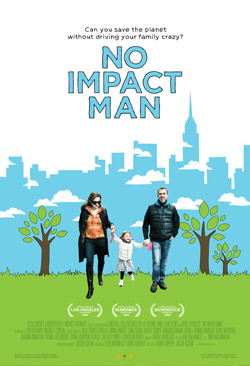
It’s a familiar pattern now: Alisa Smith and James MacKinnon ate locally for a year and wrote a book about it; Jen and Grant went zero-waste for a year, blogged and filmed a documentary about it. If doing either of those things doesn’t seem crazy and transformative enough, Colin Beavan’s family of three did both for a year, and turned off their electricity (for 6 months), self-powered their transportation, went vegetarian and stopped using toilet paper. The project, No Impact Man, is a film, a book and a blog about eliminating one’s personal impact on the environment.
The point of doing something this extreme, he cautioned, was not to suggest that everyone do it, but that everyone can do something. Individual actions, he says, inspire and engage others to act. That’s the power of community, something he says has eroded. It’s also a challenge to us to consider what really is necessary for daily life and what we could do without. As Colin puts it, living with a low impact is about “doing more good than harm.” At the end of their year, Colin’s wife Michelle decided she’d like to keep cycling (something she’d never have considered a year earlier) and not bring back their TV — except on vacation.
Continue reading Film review: No Impact Man »
I had an interesting time at Metrotown on Friday. Rows upon rows of sequined plastic iPhone cases, “50/50” t-shirts at American Apparel as if 50% polyester were a selling point, fluorescent Nikes, fake culture at Chapters induced by jazz at Starbucks, and dangerous high-heeled shoes left me feeling disconnected and a little cynical. I grew up being called weird, but looking around at this highly materialistic, throw-away, plastic culture truly made me feel weird and unable to understand its fads.
The food services produce disposable dining ware (read: garbage), poor quality food and a shockingly large crowd at McDonald’s. As my friend jokingly suggested sharing a $1.39 recipe-for-bloating, I stood there waffling between despair and a holier-than-thou attitude. I’ve become so distanced from that 12-hour a day, 7-days-a-week consumerist culture that being surrounded by it leaves me shell-shocked.
Continue reading The other 20 percent »
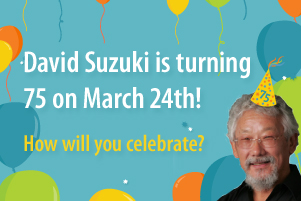 David Suzuki is turning 75 on March 24. To celebrate this momentous occasion and honour his life’s work, the David Suzuki Foundation invites you to make a gift or fundraise online to support the Foundation’s work, and send a personal message to David. There are prizes involved, and those coaxed me into signing up.
David Suzuki is turning 75 on March 24. To celebrate this momentous occasion and honour his life’s work, the David Suzuki Foundation invites you to make a gift or fundraise online to support the Foundation’s work, and send a personal message to David. There are prizes involved, and those coaxed me into signing up.
But I was at a loss for what pledge to make in return for my friends’ generosity. Jenny has pledged to bike the 60+ km round trip to work and back. Siri has promised to avoid shopping sprees until the big day. It got me thinking about what change for the greener I could make, and it wasn’t easy coming up with something — not because I’m unwilling to make lifestyle changes, but because I’ve made so many that I was struggling to find something new. I know my showers could be shorter and I really ought to shut down my old iMac hog at night. I’ll come around to a permanent commitment to those eventually. I eat four or five bananas a week, my cheese comes wrapped in plastic (I eat a lot of cheese) and I’m kind of addicted to the internet. (Just kind of.) I could change one of those for a little while, no big loss for a little bit of gain. But this isn’t about guilt, it’s about inspiring people and doing something meaningful. First, though, I have to inspire myself.
So I’m going to write a blog post about the environment every day until I reach my fundraising goal of $300. Just look at my sporadic track record: I’m going to need all the moral support I can get!
I may get carpal tunnel, avoid social occasions and frequently skip flossing in order to keep this up — but it’s David’s 75th and I believe very strongly in the work he and his Foundation does.
Will you celebrate with me? Here’s how:
1) Sponsor me online. (Two donors have pledged to match the first $15,000 raised in the campaign, so you’ll essentially be doubling your donation.)
2) Write a birthday message to David.*
3) Look for your personal message to be displayed at HappyBirthdayDavidSuzuki.com within a couple business days of your submission.
I invite you to join me and write your own blog post or comment here about what you’re doing for the environment and why. Or conversely, if you’re not doing anything, why not? I won’t guilt trip you; I’m seeking to understand. Also, if you’d like to request an eco topic about which you’re yearning to know more, leave a comment and I’ll consider it for a future post.
Thank you in advance for supporting the cause that is so very dear to my heart, and valuable to the majority of Canadians.
* It’s easy to donate online at HappyBirthdayDavidSuzuki.com. To send David a message without donating, write to contact@davidsuzuki.org.

My bathroom shelf: Toothpaste, coconut oil, shea butter, oregano oil, floss and deodorant
Let’s face it: women use more products than men, and we have a recurring, generally very wasteful (but otherwise healthy) function that they don’t have. But this doesn’t mean we need to create more garbage than these low-maintenance dudes. If you live in Metro Vancouver, you’ve seen the ads, you’ve seen the news. We create a lot of garbage, and we can’t throw it on Cache Creek forever. Our rubbish has to go somewhere, so it’s time to try harder to avoid creating it in the first place. (It’s reduce, reuse, recycle, remember.) But you’re a girl, and you have needs. Now what?
Simple.
1. Get an “eco positive period“ with the Diva Cup and a combination of smart panties and reusable cloth liners and pads. The fabrics are organic cotton and the Diva Cup merely collects your flow, so you can avoid nasty things like toxic shock syndrome and yeast infections. Other benefits? No smelly waste, no crinkly noises from plastic pads, no discomfort, and no worries about running out. Yes, it can be discreet, super fun, and still feel sexy. It will simply make your life easier, save you money and time in the long run, and reduce your footprint on the planet big time. If you’re still not convinced, read their testimonials and their tips. Lunapads is based in Vancouver. Hint: sign up for their newsletter and grab the Green Zebra coupon book to save some dough.
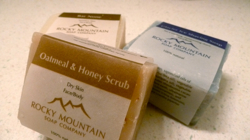 2. Happy soap! If you’re not into making your own, skip the shrinkwrap, the toxins and the plastic pumps with Rocky Mountain Soap Company‘s earth-friendly bar soap, wrapped in just a strip of paper. (Mountain Sky is another option.) They also sell a shaving* soap bar. I know you think you need foam to shave, but I dare you to try this stuff for a month and see the difference. I used to use bar soap that wasn’t even meant for shaving, then tried a foam cream in an aerosol can (what was I thinking?!). Rocky Mountain wins hands down. Their Vancouver store is on Granville & 15th, and they sell unscented soap too.
2. Happy soap! If you’re not into making your own, skip the shrinkwrap, the toxins and the plastic pumps with Rocky Mountain Soap Company‘s earth-friendly bar soap, wrapped in just a strip of paper. (Mountain Sky is another option.) They also sell a shaving* soap bar. I know you think you need foam to shave, but I dare you to try this stuff for a month and see the difference. I used to use bar soap that wasn’t even meant for shaving, then tried a foam cream in an aerosol can (what was I thinking?!). Rocky Mountain wins hands down. Their Vancouver store is on Granville & 15th, and they sell unscented soap too.
Continue reading 7 simple ways to reduce bathroom waste »
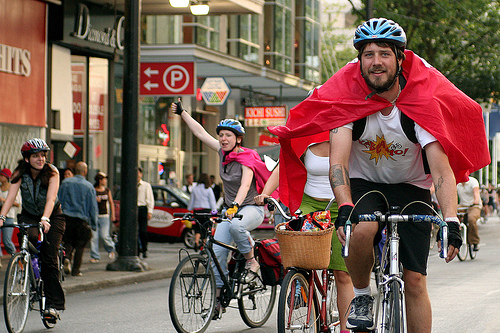
Cyclists on Robson St. Photo by cabbit via Flickr.
As Vancouver’s City Hall proposes another separated bike lane, this time on Hornby Street which currently has just a regular bike lane, the usual bike vs. car debate fires up again. I don’t see it as a choice of one over the other; we all have to get along. But as a cycling advocate and addict (and the daughter of another — I like to joke that my father was practically born on two wheels), I’d like to share some ways in which bikes make our city a better place, without getting too much into the anti-car realm here. Certainly thinking of these benefits makes me even more resistant to ever using my driver’s license for its primary purpose. The last time I used it was to hand it over so I could test ride a bike!
1. Bikes are the ultimate zero-emission vehicle.
I think we all understand that clean air is vital. Cycling contributes to cleaner air by taking pollution-emitting vehicles off the road. Having fewer cars on the road results in less traffic congestion, which should in turn reduce pollution further. Because bikes require no fossil fuels to operate (let’s not get into a debate over what fuels the human because everyone eats regardless of their mode), there is reduced strain on our non-renewable resources. We all know oil extraction has catastrophic environmental impacts even without oil spills.
Bikes are extremely efficient and use less materials. On the other hand, “These 1,300-kilogram metal boxes carry on average one-and-a-half people, approximately 130 kilos — a mere 10 per cent of the vehicle’s weight” (Yves Engler, The Mark) and require 1,860 calories per mile, compared to 35 for a bicycle, according to the WorldWatch Institute.
2. Bikes take up less space.
Whether they’re parked in an apartment or on the street, riding on the road or a trail, bikes require less physical space than cars. And when you have more space available, this makes room for more useful and pleasant aspects of a city: restaurant patios, parks, street food, community gardens, street performers, art installations, and so on. A parking space is private space, not public, when a car is on it.
Continue reading Why bikes are good for Vancouver »
I realised when I left Pecha Kucha (at the gorgeously renovated Queen Elizabeth Theatre), in a hurry to catch my 10:20 bus, that I don’t have enough conversations with people about sustainability. I attend events where the hundreds or thousands of people in the room/theatre all have a common interest, yet I go there to absorb information, chat with friends and promptly leave. I can’t blame all of that on living in the suburbs with a typically once-per-half-hour bus. But ultimately the result is that the information I gleaned and my opinions remain for the most part locked in my head and I lose the opportunity to learn from others in my community. (And Vancouver being a small city nurses an intimate though often disconnected one.)
Dialogue takes place frequently online, but in my experience it tends to be short and superficial and, while offering participation theoretically to anyone, the reality is that many voices are left out even within our own city. That’s where dialogue in person can facilitate those deeper connections that might not otherwise be made. It also lets us communicate visually. (And with that, check out RangiChangi Roots.) An event like Pecha Kucha is available to anyone with $10 and a couple hours to spare. It won’t reach everyone, but advertising in offline and particularly free media such as the Georgia Straight (I’m not sure whether it made it to street poles) pushes its reach outside of the—to some degree—exclusive online world. Over 2000 people attended Wednesday’s event, a specially-themed “Walk the Talk, Green Your City”, which is terrifically encouraging.
Continue reading Walk the Talk, Green Your City »
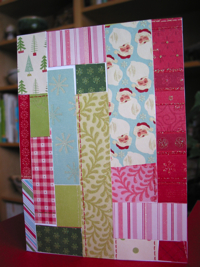 If you’re reading this you might be as last-minute with your holiday shopping as I tend to be. Admittedly my post itself is last-minute. I’ve done half my shopping and, this year, with each item I’ve put more thought than ever into what effect each will have on this finite planet. If you’re the kind of giver that prefers to give an item rather than an experience, make it meaningful not just as a useful object but as one with the smallest environmental impact possible.
If you’re reading this you might be as last-minute with your holiday shopping as I tend to be. Admittedly my post itself is last-minute. I’ve done half my shopping and, this year, with each item I’ve put more thought than ever into what effect each will have on this finite planet. If you’re the kind of giver that prefers to give an item rather than an experience, make it meaningful not just as a useful object but as one with the smallest environmental impact possible.
Before I tell you how easy it is to be eco-conscious at Christmas, you might want to know why you should:
* according to Statistics Canada, 900,000 tonnes of garbage is produced between Thanksgiving and Christmas each year
* transportion of gifts that are produced a great distance away, whether it’s Califonia or China, emits greenhouse gases that pollute our air and contribute to climate change
* logging of old-growth forests to produce “virgin” paper products releases CO2 into the atmosphere and threatens animal habitat (think of the caribou and the owls!)
* conventional plastic is a petroleum-based product, which carries a triple-threat carbon footprint
* it takes resources and produces waste to make something new and to recycle or dispose of it at the end of its life cycle (which, these days, is often pretty short!)
* that regiftable stuff is better off loved by someone else than being a guilt trip in your closet for you or your kids!
* buying local supports the local economy and friends of your friends
* and more environmental, ethical and health-related reasons…
h3. Ok, I get it. I’ll be good this year. How easy is it?
Got a bookstore nearby? A Choices/Capers/Whole Foods? MEC? Independent coffee shop? Granville Island? Main St or Commercial Drive? You can make smart choices anywhere — that includes IKEA. I did not have to go out of my way to get smart gifts for my family. A bit of thoughtfulness and planning is all it takes. And do I ever feel good about it!
Here are some suggestions and tips!
Continue reading I’m dreaming of a Green Christmas… gift, that is »
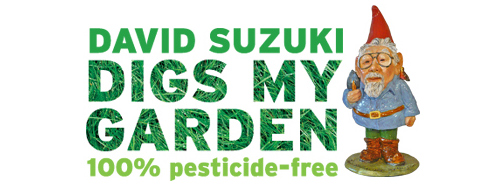
The third annual David Suzuki Digs My Garden contest is on full steam ahead this year, with the three winning gardeners featured as bloggers on the brand new DMG website. Each week the bloggers—from Richmond, BC, Edmonton, AB, and Ancanster, ON—post blogs and videos, and help answer questions from the public such as, how do I thwart those pesky digging squirrels? or, how do I get rid of dandelions without chemicals? It’s all about being green, too—these gardeners pride themselves on having beautiful foliage without the pesticides.
Continue reading Does David Suzuki dig your garden? »
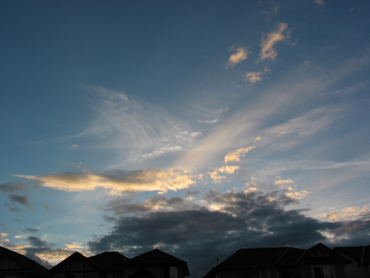
Feeling inspired, I’d like to start a meme on what actions you’re taking, or planning to take (a pledge!) to help the environment. This is a broad-reaching scope, and encompasses anything and everything: choosing organic food, taking transit, composting, donating to an environmental organization, recycling unwanted goods, installing solar panels, or even just educating yourself on issues and solutions. Is there a particular action that tops your list? Or one you’ve been eager to try?
For brevity’s sake we’ll keep the list to 10 items. You can divide it up between “doing” and “intend to do” in whatever ratio you like.
So here’s my list, in no particular order:
Right now, I:
1. Eat local
2. Use cloth bags and compostable plastic bags
3. Advocate for revival of the Interurban community rail
4. Reduce, reuse, recycle!
5. Use strictly natural cosmetics and soaps, with recyclable packaging and no chemicals
6. Use strictly natural cleaners (baking soda, vinegar, water, the occasional lemon)
7. Use a reusable stainless steel water bottle
I will:
8. Reduce waste by switching to Lunapads products (they’re local!) — immediately
9. Live in a walkable neighbourhood with frequent, accessible transit — 2 to 3 years’ time
10. Buy a cradle-to-cradle, toxic-free sofa made from natural materials — 2 to 3 years’ time
Continue reading 10 things you’re doing/will do for the environment »
 Yes, I’m an environmentalist. Dirty word, right? I remember writing “closet environmentalist” in my Facebook profile as if it were something to be ashamed of. I realised after awhile that it isn’t, and defining myself as one is as familiar as the back of my hand. I remember someone, perhaps David Suzuki, saying we’re all environmentalists, but that requires a definition I can’t quite remember. It has something to do with our reliance on nature, I think. At any rate, here I am to tell you why I’m an environmentalist and what that really means.
Yes, I’m an environmentalist. Dirty word, right? I remember writing “closet environmentalist” in my Facebook profile as if it were something to be ashamed of. I realised after awhile that it isn’t, and defining myself as one is as familiar as the back of my hand. I remember someone, perhaps David Suzuki, saying we’re all environmentalists, but that requires a definition I can’t quite remember. It has something to do with our reliance on nature, I think. At any rate, here I am to tell you why I’m an environmentalist and what that really means.

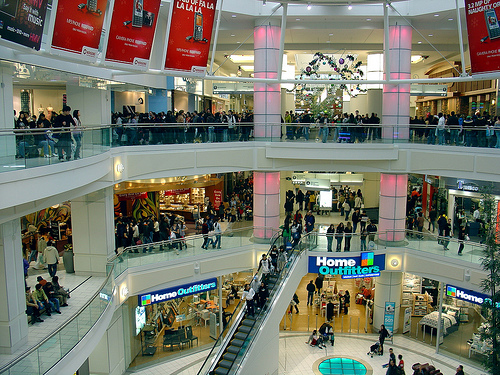 Metrotown on Boxing Day, 2006. Photo by
Metrotown on Boxing Day, 2006. Photo by 

 2. Happy soap! If you’re not into making your own, skip the shrinkwrap, the
2. Happy soap! If you’re not into making your own, skip the shrinkwrap, the 
 If you’re reading this you might be as last-minute with your holiday shopping as I tend to be. Admittedly my post itself is last-minute. I’ve done half my shopping and, this year, with each item I’ve put more thought than ever into what effect each will have on this finite planet. If you’re the kind of giver that prefers to give an item rather than an experience, make it meaningful not just as a useful object but as one with the smallest environmental impact possible.
If you’re reading this you might be as last-minute with your holiday shopping as I tend to be. Admittedly my post itself is last-minute. I’ve done half my shopping and, this year, with each item I’ve put more thought than ever into what effect each will have on this finite planet. If you’re the kind of giver that prefers to give an item rather than an experience, make it meaningful not just as a useful object but as one with the smallest environmental impact possible.
